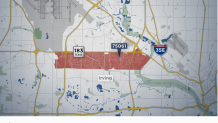Health officials in Dallas County are reporting this year's second human case of West Nile Virus.
The patient lives in the 75061 zip code in Irving and has been diagnosed with West Nile neuroinvasive disease, the more serious form of the virus.

This is the same zip code where the first patient in Dallas County was diagnosed with West Nile neuroinvasive disease last week.
For medical confidentiality and personal privacy reasons, further identifying information is not released.
Symptoms for West Nile Neuroinvasive Disease include headache, high fever, neck stiffness, stupor, disorientation, coma, tremors, convulsions, muscle weakness, and paralysis.
According to the World Health Organization it is estimated that approximately 1 in 150 persons infected with the West Nile virus will develop a more severe form of disease. Serious illness can occur in people of any age, however people over the age of 50 and some immunocompromised persons (for example, transplant patients) are at the highest risk for getting severely ill when infected with WNV.
Local
The latest news from around North Texas.
- Dress in long sleeves, pants when outside: For extra protection, spray thin clothing with repellent.
- DEET: Make sure this ingredient is in your insect repellent.
- Drain standing water in your yard and neighborhood: Mosquitoes can develop in any water stagnant for more than three days.
It has been recommended in the past that to avoid mosquito bites you should avoid being outdoors during Dusk and Dawn (the 4 Ds). While this is true for mosquitoes that commonly carry the West Nile virus, other types of mosquitoes that are more likely to carry Zika, dengue and chikungunya are active during the day. When outdoors, no matter what time of day, adjust your dress accordingly and wear insect repellent containing DEET, picaridin or oil of lemon eucalyptus as your first line of defense against insect bites.



